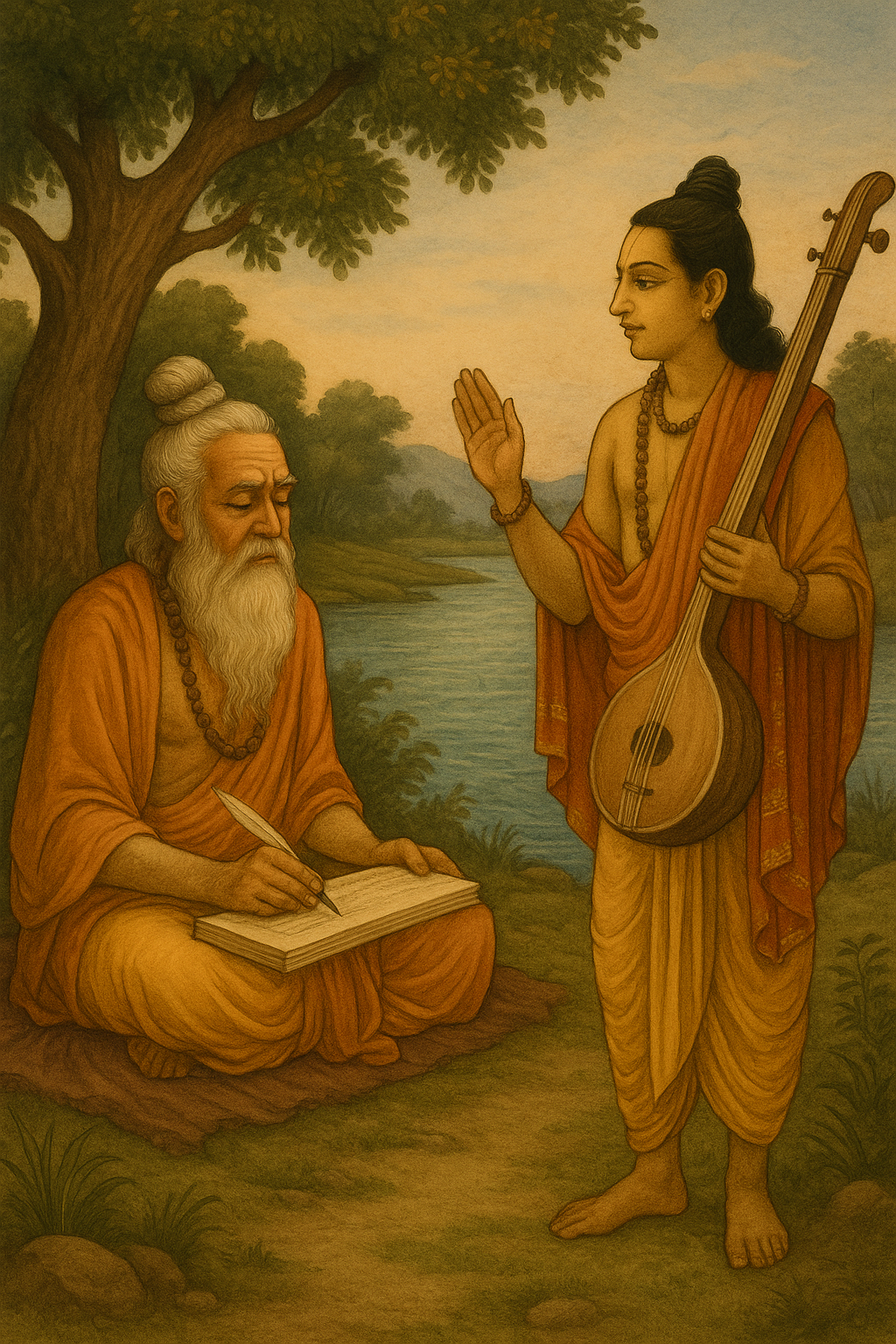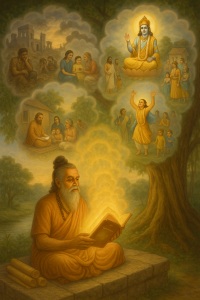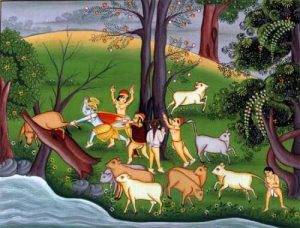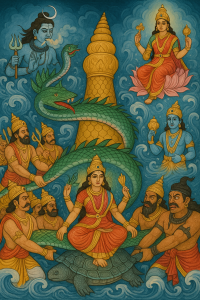Vyāsadeva’s Dissatisfaction
After compiling the vast body of Vedic literature—including the four Vedas, the Brahma-sūtras, the Mahābhārata, and the Purāṇas—Śrīla Vyāsadeva, the literary incarnation of the Lord, sat in solitude by the banks of the Sarasvatī River.
Despite his monumental work, he felt inexplicably empty and dissatisfied.
He reflected:
“I have explained dharma, karma, varṇāśrama, and even touched on spiritual truths… yet my heart is not satisfied. What is missing?”
At that moment, the divine sage Nārada Muni—the eternal messenger of bhakti—arrived, glowing with spiritual brilliance.
The Honest Inquiry of Vyāsa
Vyāsa welcomed Nārada with reverence and expressed his concern:
“O revered ṛṣi, I have written vast scriptures, guiding people in their duties. Yet my soul is uneasy. Kindly enlighten me—where have I fallen short?”
Nārada replied with compassion and spiritual firmness:
“O Vyāsa, you have described dharma, artha, kāma, and mokṣa. But you have not directly glorified the Supreme Lord Śrī Kṛṣṇa with full, unalloyed devotion.
You have mentioned Him only indirectly or alongside other topics. As a result, your heart remains unfulfilled—and so will the hearts of those who read your works.”
Nārada’s Powerful Instructions
Nārada continued:
“Even if a person performs all prescribed duties and rituals but does not develop attraction for Kṛṣṇa, his effort is a failure.
Conversely, even if someone stumbles or falls while sincerely practicing devotion to the Lord, he is never lost. Bhakti redeems all.”
Nārada then shared his own life story, how in a previous birth he had been the son of a servant woman. By the grace of saintly devotees, he developed taste for harikathā (Kṛṣṇa-kathā). Upon death, he was reborn as Nārada Muni, the transcendental wanderer, constantly chanting and glorifying the names of the Lord.
“Therefore, O Vyāsa, compose a work that will sing the pure glories of Bhagavān—His names, forms, qualities, and pastimes—free from dry logic and fruitive prescriptions. Let it shine with rasa, the nectar of devotion.”
The Birth of Śrīmad Bhāgavatam
Vyāsa took these words to heart. He sat in deep samādhi, meditating on the Supreme Lord Śrī Kṛṣṇa and His eternal pastimes in Vṛndāvana, Mathurā, and Dvārakā.
He then composed the Śrīmad Bhāgavatam, the essence of all the Vedas, describing the Lord as the source of all avatāras, the object of all knowledge, and the shelter of all beings.
This work began with:
“Om namo bhagavate vāsudevāya
I offer my respectful obeisances unto the Supreme Personality of Godhead, Vāsudeva, the source of everything, whose glories purify the heart.”
The Bhāgavatam: The Remedy for Kali-yuga
Vyāsa taught this divine Purāṇa to his son Śukadeva Gosvāmī, who would later deliver it to Mahārāja Parīkṣit.
Nārada’s instructions became the turning point in history, ensuring that a scripture would exist that focused solely on pure bhakti, free from karma, jñāna, or other mixed goals.
The Śrīmad Bhāgavatam became the lamp for Kali-yuga, the means by which all souls could:
- Hear about Kṛṣṇa’s pastimes,
- Sing His holy names,
- Meditate on His lotus feet,
- And attain liberation through love alone.
Lessons to Be Learned:
- Even great works can leave the heart empty if they lack glorification of Kṛṣṇa.
- The essence of scripture is not morality or rituals—but bhakti.
- Śrīmad Bhāgavatam is the remedy for the darkness of Kali-yuga.
- Nārada Muni is the eternal guru of devotion, reminding us that love of God is the highest aim.
- Only pure devotional service satisfies the soul, not dry knowledge or fruitive results.
Origin of the Story: Śrīmad Bhāgavatam – Canto 1, Chapters 4–6; contextual to Harivaṁśa Purāṇa



